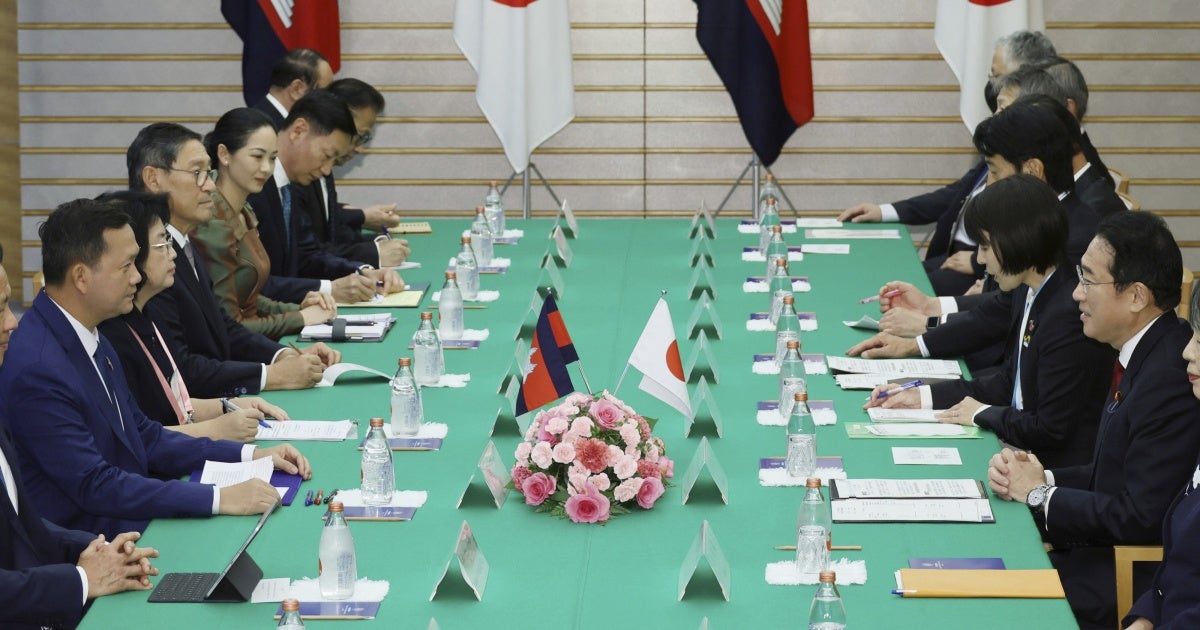Urge Cambodia Leader On Rights During Japan Visit
Japan 's Prime Minister Shigeru Ishiba should publicly raise human rights issues when Cambodian Prime Minister Hun Manet visits Tokyo in late May, Human Rights Watch said today. The Cambodian government has increasingly suppressed freedom of expression and assembly, the rights of workers, and Cambodian government critics in Japan and other countries.
"Cambodian Prime Minister Hun Manet's visit to Japan provides an important opportunity for Prime Minister Shigeru Ishiba to publicly raise key human rights concerns, from press freedom and workers' rights to Cambodia's targeting of critics in Japan and elsewhere," said Teppei Kasai, Asia program officer at Human Rights Watch. "As a major aid donor and trade partner, Japan should be clear that there cannot be business as usual so long as the Cambodian government continues to oppress its people."
Human Rights Watch, in a letter to Japan's Foreign Ministry on April 28, said that under Hun Manet, who became prime minister in 2023, the Cambodian government has increasingly curtailed the rights to freedom of expression and peaceful assembly, targeted independent media, and carried out politically motivated arrests and detention of dissidents and government critics. His father, Hun Sen, who had ruled Cambodia since 1985, serves as Senate president and remains head of the ruling Cambodian People's Party.
The Cambodian government's record on respecting and protecting workers' freedom of association in line with International Labour Organization (ILO) conventions has deteriorated over the past decade. The 2016 Trade Union Law introduced mandatory registration of unions and excessive rules around Most Representative Status, which effectively placed barriers on unions' ability to collectively bargain and represent workers before the Arbitration Council in collective disputes.
Despite recent amendments to the Trade Union Law, its provisions pose significant legal barriers for workers to form and join unions of their choosing, have union representation during collective bargaining, and gain access to collective dispute resolution through unions. In June 2024, the ILO Committee on Application of Standards recommended changes to Cambodian regulations to protect the ability of unions to register and operate.
In May 2024, a number of United Nations member states urged Cambodia during its Universal Periodic Review to ensure freedom of association for civil society and labor groups, and improve working conditions and labor standards.
Prime Minister Ishiba should urge Hun Manet to amend the Trade Union Law, the Law on Associations and Non-Governmental Organizations, and other relevant legislation so that they align with international human rights and labor standards.
The Cambodian government has also repeatedly reached across its borders, including to Japan, to harass and threaten critics of the government and exiled opposition party members living abroad, a practice known as transnational repression.
In May 2024, Sun Chanthy, the head of the opposition National Power Party, was arrested after returning from Japan, where he gave a speech to supporters critical of the Cambodian government. In July, a Cambodian court found Teav Vannol, who leads the opposition Candlelight Party, guilty of defamation and fined him US$1.5 million after he criticized Hun Manet and Hun Sen in a media interview in Tokyo.
In August 2024, authorities in Cambodia forcibly disappeared Vannith Hay, the 28-year-old brother of a Japan-based activist, Vanna Hay, after Hun Sen threatened Vanna Hay in a speech earlier that month. At the time, Vanna Hay led the opposition Cambodia National Rescue Movement in Japan and was a critic of the Cambodia-Laos-Vietnam Triangle Development Area (CLV), an economic development plan involving the border provinces of the three countries.
In October 2024, two envoys of Hun Sen came to Japan and effectively forced Vanna Hay to record a video at a Tokyo hotel in which he apologized for his past activism and pledged allegiance to Cambodia's ruling party. On October 18, a Phnom Penh court ordered Vannith Hay's release, the same day Hun Sen posted Vanna Hay's apology video on social media.
Prime Minister Ishiba should publicly call on Cambodia's leadership to immediately stop threatening critics both at home and abroad, and release those wrongfully detained for exercising their basic rights, Human Rights Watch said.
"In line with its pledge of human rights diplomacy, Prime Minister Ishiba should use Hun Manet's rare visit to impress upon the Cambodian government its responsibility to protect the rights of people in Cambodia," Kasai said. "Japan's silence on these matters will provide the Cambodian government a green light to continue its repressive tactics."
https://www.hrw.org/news/2025/05/18/japan-press-cambodias-leader-human-rights
View Original | AusPol.co Disclaimer
